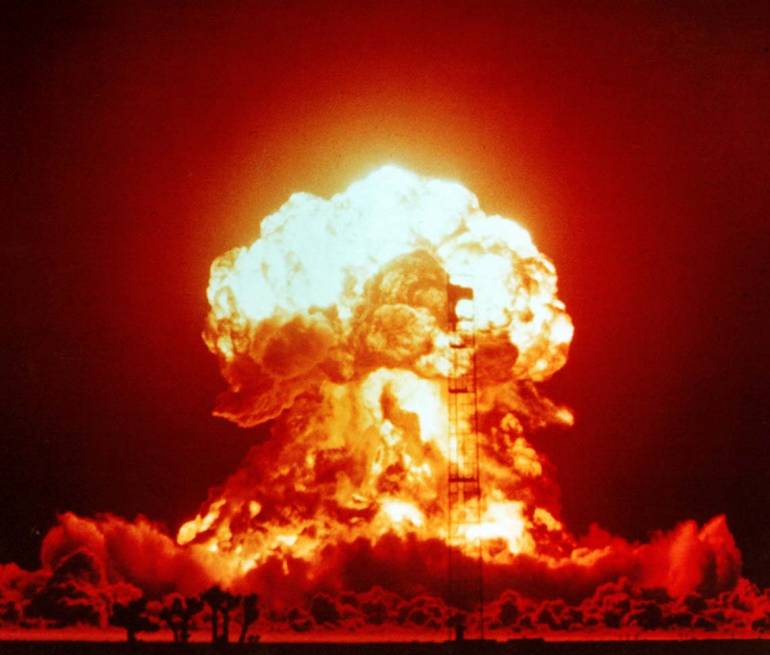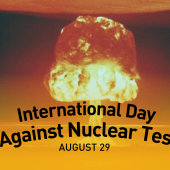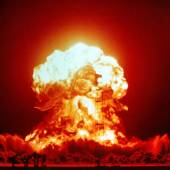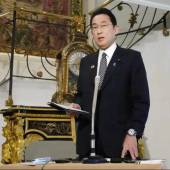International Day Against Nuclear Tests (August 29)

Nuclear explosions can cause significant damage and casualties from the blast, the heat, and the radiation. One can only keep one’s family safe by knowing what to do and being prepared if it occurs.
A nuclear weapon is a device that uses nuclear reaction to create an explosion. Nuclear devices range from a small portable device carried by an individual to a weapon carried by a missile.
A nuclear explosion may occur with or without a few minutes warning. Fallout is most dangerous in the first few hours after the detonation when it is giving off the highest levels of radiation.
Poisoned groundwater, cancer, leukemia, radioactive fallout — these are among the poisonous legacies of nuclear testing.
The best way to honor the victims of past tests is to prevent any in the future.
The Soviet Union exploded hundreds of nuclear devices over a period of 40 years at the Semipalatinsk Test Site in Kazakhstan — but all of that stopped when the test site closed 25 years ago, on Aug. 29, 1991.
Now, the United Nations recognizes the International Day Against Nuclear Tests every year on that date to commemorate the decision by Kazakhstan’s President Nursultan Nazarbayev to shut the site down.
“Every effort should be made to end nuclear tests in order to avert devastating and harmful effects on the lives and health of people and the environment,” states U.N. Resolution 64/35, which the General Assembly accepted in 2009 to establish the Day Against Nuclear Tests.
It is an appropriate time to condemn any decision to test nuclear weapons and demand the United Nations and its member states to STOP nuclear testing. And all the citizens worldwide should come together against nuclear testing and support the ratification of the “treaty on the prohibition of nuclear weapons” from their respective countries.
It is said that nuclear-armed states spent US$73 billion on their arsenal year.
All the world leaders should come together on this matter for making use of a huge amount of money to eradicate poverty, to provide employment opportunities, to provide quality education, clean energy and equal rights for all.
It is a time to accelerate the development of the Covid-19 vaccine, to save life and to recover from a collapsing world economy.
In our past, the tremendous damage from nuclear disasters has cost people their lives and has threatened to damage society for ages to come. The next nuclear war will not only cause death but threaten the extinction of death itself.
People should understand that nuclear weapons are dangerous, destabilizing, indiscriminate, and potentially catastrophic.
Today’s nuclear weapons are hundreds of times more powerful than those of Hiroshima and Nagasaki. Right now there are 13,355 nuclear weapons in the hands of nine nations, about 2,000 of these weapons are on high alert, which means some of them can be launched within 15 minutes on command.
Our future hangs on the precipice by the nuclear-armed states.
The coronavirus pandemic has submerged the world, and the global economy, while the security situation is deteriorating. At this crucial time, any conversation of testing a nuclear weapon is completely unfounded and misplaced. Therefore, we must stand against it.
The International Day Against Nuclear Tests serves as a reminder of the 1996 Comprehensive Nuclear Test Ban Treaty that the U.N. adopted, but has not yet entered into force. The treaty would ban all nuclear testing or explosions in any setting, yet eight states in the world have not signed or ratified it yet: China, Egypt, India, Iran, Israel, North Korea, Pakistan and the United States.
Radio Veritas Asia (RVA), a media platform of the Catholic Church, aims to share Christ. RVA started in 1969 as a continental Catholic radio station to serve Asian countries in their respective local language, thus earning the tag “the Voice of Asian Christianity.” Responding to the emerging context, RVA embraced media platforms to connect with the global Asian audience via its 21 language websites and various social media platforms.













